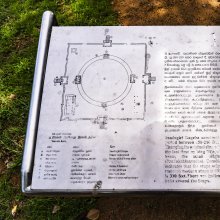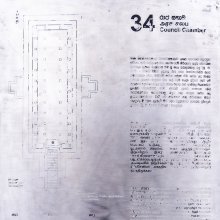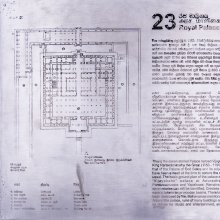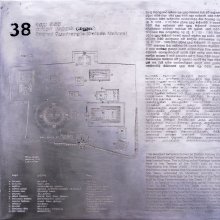Vena, Veṇa, Veṇā: 21 definitions
Introduction:
Vena means something in Hinduism, Sanskrit, Buddhism, Pali, the history of ancient India, Marathi, Jainism, Prakrit, Tamil. If you want to know the exact meaning, history, etymology or English translation of this term then check out the descriptions on this page. Add your comment or reference to a book if you want to contribute to this summary article.
Images (photo gallery)
In Hinduism
Dharmashastra (religious law)
Source: Wisdom Library: Dharma-śāstraVeṇa (वेण) is a Sanskrit word referring to “one who deals in articles made of bamboo”. The word is used throughout Dharmaśāstra literature such as the Manusmṛti. (also see the Manubhāṣya verse 4.215)

Dharmashastra (धर्मशास्त्र, dharmaśāstra) contains the instructions (shastra) regarding religious conduct of livelihood (dharma), ceremonies, jurisprudence (study of law) and more. It is categorized as smriti, an important and authoritative selection of books dealing with the Hindu lifestyle.
Purana and Itihasa (epic history)
Source: archive.org: Puranic Encyclopedia1) Vena (वेन).—An ancient King who was notorious for his bad rule. Genealogy. Descended from Viṣṇu in the following order: Brahmā-Svāyambhuva Manu-Uttānapāda-Dhruva-Śiṣṭi-Ripu-Cākṣuṣa Manu-Kuru-Aṅga-Vena. (See full article at Story of Vena from the Puranic encyclopaedia by Vettam Mani)
2) Vena (वेन).—One of the ten sons of Vaivasvata Manu. (Mahābhārata, Ādi Parva, Chapter 75, Stanza 15).
3) Veṇā (वेणा).—A river famous in the Purāṇas. Information about this river, taken from Mahābhārata, is given below:
(i) Veṇā-river stays in the palace of Varuṇa serving him. (Mahābhārata Sabhā Parva, Chapter 9, Stanza 18).
(ii) Sahadeva defeated the ruler of the country at the basin of river Veṇā, during his conquest of the regions of the south. (Mahābhārata Sabhā Parva, Chapter 31, Stanza 12).
(iii) Those who fast on the basin of this river for three days will go to heaven in an aerial chariot yoked with pea-cocks and swans. (Mahābhārata Vana Parva, Chapter 85, Stanza 32).
(iv) Among the rivers which originate fire, this river also is included. (Mahābhārata Vana Parva, Chapter 224, Stanza 24).
(v) It is mentioned in Mahābhārata, Anuśāsana Parva, Chapter 165, Stanza 20, that this is a river worthy to be remembered every morning and evening.
Source: Cologne Digital Sanskrit Dictionaries: The Purana Index1a) Veṇā (वेणा).—A tīrtha sacred to Amṛta;1 sacred to the Pitṛs.2
1b) A R. from the Vindhyas; visited by Balarāma.*
- * Matsya-purāṇa 114. 27. Bhāgavata-purāṇa X. 79. 12.
2) Vena (वेन).—A son of Anga, of cruel and wrong behaviour; fell dead due to the curse of sages who churned his right arm out of which came Pṛthu; born after aśvamedha of his father. The twenty-third Vedavyāsa.1 Brought up in the house of his grandfather who was an aṃśa of Mṛtyu (adharma) Vena acquired bad conduct, killed his playmates like animals and became a source of vexation to his father who left the kingdom in disgust and distress. Vena was crowned. Blinded by pride he proclaimed that there should be no more yajñas or gifts in his kingdom. Lost it through pride of power. He did not listen to the words of sages and asserted he was the highest of all gods. Seeing him perverse and vile, the sages slew him; Sunīthā protected his body by mantra. To avoid anarchy and to preserve the line of Anga, the sages churned the thigh of the dead prince and there came a black dwarfish man, the ancestor of the Niṣādha race.2 They continued to churn the two arms out of which came a male and female child, being the aṃśa of Viṣṇu and Lakṣmī.3 Thrown into hell by Brāhmaṇas, was saved from hell by Pṛthu.4 Pṛthu was the father's part of Vena's body; from the mother's part of his body came the Mlecchas.5 Another version: A son of the daughter of Kāla; took to kāma and covetousness; founded an adharma sthāpana, gave up Veda śāstras; subjects of, did not learn Vedas or performed ceremonials or yajñas; made himself the object of sacrifice and worship; enraged by the ṛṣis led by Marīci who advised him to take up the right path; ridiculed them and said he was a mahātmā and could burn the whole world or flood it; hence the sages held him down and had his left hand churned by force; there came out a short black figure who stood trembling; the sages said niṣīda, the forerunner of the niṣādavaṃśa; then they churned his right hand and Pṛthu was born; Vena died; Pṛthu crowned by all; a good king; his rule and achievements, including the milking of the earth by all beings.6
- 1) Bhāgavata-purāṇa IV. 13. 18-20; 35. 38; Brahmāṇḍa-purāṇa II. 35. 122; Matsya-purāṇa 4. 44.
- 2) Bhāgavata-purāṇa IV. 13. 39, 42 and 47; ch. 14 (whole).
- 3) Ib. IV. 15. 1-3; 16. 11; X. 73. 20.
- 4) Ib. II. 7. 9; VII. 1. 16; Brahmāṇḍa-purāṇa II. 36. 108-12, 121-27, 150.
- 5) Matsya-purāṇa 10. 4-10.
- 6) Vāyu-purāṇa 62. 108-193.
Vena (वेन) is a name mentioned in the Mahābhārata (cf. I.70.13) and represents one of the many proper names used for people and places. Note: The Mahābhārata (mentioning Vena) is a Sanskrit epic poem consisting of 100,000 ślokas (metrical verses) and is over 2000 years old.
Source: Shodhganga: The saurapurana - a critical study1) Vena (वेन) refers to one of the son of Aṅga: one of the many sons of Cākṣuṣamanu, according to the Vaṃśa (‘genealogical description’) of the 10th century Saurapurāṇa: one of the various Upapurāṇas depicting Śaivism.—Accordingly, [...] Puṣkariṇī gave birth to Cākṣuṣamanu, the son of Cakṣuṣa. In his race there were born Aṅga, Kradu, Śiva and many others. Vena was born to Aṅga and from Vena was born Pṛthu Vainya, who was a famous king in ancient times and for the welfare of mankind he milked the earth in the form of a cow.
Vena (वेन) is the name of an ancient king said to have incarnated as the demon Andhaka, according to the Vāmanapurāna, Saromāhātmya 27.7-9.—According to the Saurapurāṇa, Andhaka or Antaka is the name a demon mentally born from Śiva.

The Purana (पुराण, purāṇas) refers to Sanskrit literature preserving ancient India’s vast cultural history, including historical legends, religious ceremonies, various arts and sciences. The eighteen mahapuranas total over 400,000 shlokas (metrical couplets) and date to at least several centuries BCE.
Kavya (poetry)
Source: Shodhganga: The Kavyamimamsa of RajasekharaVeṇā (वेणा) is the name a locality mentioned in Rājaśekhara’s 10th-century Kāvyamīmāṃsā.—It is a tributary of the river Kṛṣnā.

Kavya (काव्य, kavya) refers to Sanskrit poetry, a popular ancient Indian tradition of literature. There have been many Sanskrit poets over the ages, hailing from ancient India and beyond. This topic includes mahakavya, or ‘epic poetry’ and natya, or ‘dramatic poetry’.
Jyotisha (astronomy and astrology)
Source: Wisdom Library: Brihat Samhita by VarahamihiraVeṇā (वेणा) refers to a river belonging to “Dakṣiṇa or Dakṣiṇadeśa (southern division)” classified under the constellations of Uttaraphālguni, Hasta and Citrā, according to the system of Kūrmavibhāga, according to the Bṛhatsaṃhitā (chapter 14), an encyclopedic Sanskrit work written by Varāhamihira mainly focusing on the science of ancient Indian astronomy astronomy (Jyotiṣa).—Accordingly, “The countries of the Earth beginning from the centre of Bhāratavarṣa and going round the east, south-east, south, etc., are divided into 9 divisions corresponding to the 27 lunar asterisms at the rate of 3 for each division and beginning from Kṛttikā. The constellations of Uttaraphālguni, Hasta and Citrā represent the southern division consisting of [i.e., Veṇā] [...]”.

Jyotisha (ज्योतिष, jyotiṣa or jyotish) refers to ‘astronomy’ or “Vedic astrology” and represents the fifth of the six Vedangas (additional sciences to be studied along with the Vedas). Jyotisha concerns itself with the study and prediction of the movements of celestial bodies, in order to calculate the auspicious time for rituals and ceremonies.
General definition (in Hinduism)
Source: archive.org: Vedic index of Names and Subjects1) Vena (वेन) Vena occurs in one passage of the Rigveda as a generous patron. Pṛthavāna, found in the same passage, may or may not be another name of his, and Pārthya in the following stanza of the hymn is perhaps his patronymic.
2) Vena in the Rigveda1 is thought by Tilak to be the planet Venus. But this is certainly impossible.
India history and geography
Source: Cologne Digital Sanskrit Dictionaries: Indian Epigraphical GlossaryVenā.—(EI 31), a kind of grass. Note: venā is defined in the “Indian epigraphical glossary” as it can be found on ancient inscriptions commonly written in Sanskrit, Prakrit or Dravidian languages.

The history of India traces the identification of countries, villages, towns and other regions of India, as well as mythology, zoology, royal dynasties, rulers, tribes, local festivities and traditions and regional languages. Ancient India enjoyed religious freedom and encourages the path of Dharma, a concept common to Buddhism, Hinduism, and Jainism.
Languages of India and abroad
Pali-English dictionary
Source: BuddhaSasana: Concise Pali-English Dictionaryveṇa : (m.) basket-maker.
Source: Sutta: The Pali Text Society's Pali-English DictionaryVeṇa, (cp. *Sk. vaiṇa, dial. ) 1. a worker in bamboo PvA. 175.—2. a member of a low & despised class (cp. pukkusa) Vin. IV, 6; S. I, 93 (°kula); A. II, 85 (id.); III, 385; Pug. 51; f. veṇī J. V, 306 (=tacchikā C.); Pv III, 113 (read veṇī for veṇiṃ). (Page 647)

Pali is the language of the Tipiṭaka, which is the sacred canon of Theravāda Buddhism and contains much of the Buddha’s speech. Closeley related to Sanskrit, both languages are used interchangeably between religions.
Marathi-English dictionary
Source: DDSA: The Molesworth Marathi and English Dictionaryvēṇa (वेण).—f sometimes vēṇā f (vēdanā S) A throe, a pang in travail. v dē, yē, hō; and esp. in pl, and then vēṇā or vēṇyā. 2 A sudden and lancinating pain (as in discharging the bowels, or as in the bowels or belly at any season). v kara, dē. 3 (not vēṇā) The quality or character of a delivery of the birth (as to its easiness or hardness, naturalness, contrariness &c.) vēṇā or ṇyā dēṇēṃ To make vehement efforts.
--- OR ---
vēṇā (वेणा).—a C Husked coarsely in a gharaṭa (not pounded in a mortar);--used esp. of a red and inferior kind of rice. vēṇē tāndūḷa m pl Rice imperfectly husked, and, not by pounding or beating (saḍaṇēṃ), but by mill-grinding (bharaḍaṇēṃ).
Marathi is an Indo-European language having over 70 million native speakers people in (predominantly) Maharashtra India. Marathi, like many other Indo-Aryan languages, evolved from early forms of Prakrit, which itself is a subset of Sanskrit, one of the most ancient languages of the world.
Sanskrit dictionary
Source: DDSA: The practical Sanskrit-English dictionaryVeṇa (वेण).—
1) A musician by caste; cf. वैदेहकेन त्वम्बुष्ठ्यामुत्पन्नो वेण उच्यते (vaidehakena tvambuṣṭhyāmutpanno veṇa ucyate) Manusmṛti 1.19; वेणानां भाण्डवादनम् (veṇānāṃ bhāṇḍavādanam) 1.49.
2) Name of a king, son of Aṅga and said to be a descendant of Manu Svāyambhuva. [When he became king, he issued a proclamation prohibiting all worship and sacrifices. The sages strongly remonstrated with him, but when he turned a deaf ear to their words, they killed him with 'blades of consecrated Kuśa grass.' The kingdom was now without a ruler. So they rubbed the thigh of the dead body, until a Niṣāda came forth, short in stature and with a flat face. They then rubbed the right arm, and from it sprang the majestic Pṛthu (see Pṛthu). According to the Padma Purāṇa, Veṇa began his reign well, but subsequently fell in to Jaina heresy. He is also said to have caused confusion of castes; cf. Manusmṛti 7.41;9.66-67.].
3) A worker in reed or bamboo; Manusmṛti 4.215 (com. veṇorbhedena yo jīvati, vuruḍa iti viśvarūpaḥ).
Derivable forms: veṇaḥ (वेणः).
--- OR ---
Veṇā (वेणा).—Name of a river (joining the Kṛṣṇā).
--- OR ---
Vena (वेन).—See वेण (veṇa) (2).
Source: Cologne Digital Sanskrit Dictionaries: Shabda-Sagara Sanskrit-English DictionaryVeṇa (वेण).—m.
(-ṇaḥ) A musician, one by birth the son of a woman of the Ambash't'ha and man of the Vaideha caste. E. veṇ to play on a musical instrument, aff. ac .
--- OR ---
Vena (वेन).—m.
(-naḥ) Brahma. E. vī substituted for aj to go, Unadi aff. na .
Source: Cologne Digital Sanskrit Dictionaries: Benfey Sanskrit-English DictionaryVeṇa (वेण).—m. 1. The son of a Vaideha by an Ambaṣṭha woman, [Mānavadharmaśāstra] 10, 19. 2. A proper name, 7, 41.
--- OR ---
Vena (वेन).—[ven + a], m. Brahman.
Source: Cologne Digital Sanskrit Dictionaries: Cappeller Sanskrit-English DictionaryVeṇa (वेण).—[masculine] worker in reed (a cert. caste); [feminine] ā [Name] of a river.
--- OR ---
Vena (वेन).—[feminine] ī longing for desirous of, loving; [masculine] longing for, wish, desire (also [feminine] ā), a man’s name.
Source: Cologne Digital Sanskrit Dictionaries: Monier-Williams Sanskrit-English Dictionary1) Veṇa (वेण):—[from veṇ] m. (cf. veṇu and vīṇā) a worker in reed, [Viṣṇu-smṛti, viṣṇu-sūtra, vaiṣṇava-dharma-śāstra [Scholiast or Commentator]]
2) [v.s. ...] a musician (by caste, the son of a Vaideha and an Ambaṣṭhī), [Manu-smṛti x, 19; 49] (cf. vaiṇa)
3) [v.s. ...] the son of an Ugra and a Kṣatriyā (who lives as a necromancer and conjuror), [cf. Lexicographers, esp. such as amarasiṃha, halāyudha, hemacandra, etc.]
4) [v.s. ...] [varia lectio] for vena q.v.
5) Veṇā (वेणा):—[from veṇa > veṇ] a f. See next.
6) [v.s. ...] b f. Name of a woman, [Hemacandra’s Pariśiṣṭaparvan]
7) [v.s. ...] of a river, [Mahābhārata; Kāvya literature etc.]
8) Vena (वेन):—[from ven] mf(ī)n. yearning, longing, eager, anxious, loving, [Ṛg-veda]
9) [v.s. ...] m. longing, desire, wish, care, [ib.]
10) [v.s. ...] Name of the hymn, [Ṛg-veda x, 123] (beginning with ayaṃ venaḥ), [Śāṅkhāyana-brāhmaṇa]
11) [v.s. ...] = yajña, [Naighaṇṭuka, commented on by Yāska iii, 17]
12) [v.s. ...] Name of a divine being of the middle region, [Naighaṇṭuka, commented on by Yāska v, 4; Nirukta, by Yāska x, 38] (also applied to Indra, the Sun, Prajā-pati, and a Gandharva; in [Aitareya-brāhmaṇa i, 20] connected with the navel)
13) [v.s. ...] of various men, ([especially]) of the author of [Ṛg-veda ix, 85; x, 123] (having the [patronymic] bhārgava)
14) [v.s. ...] of a Rājarṣi or royal Ṛṣi (father of Pṛthu, and said to have perished through irreligious conduct and want of submissiveness to the Brāhmans; he is represented as having occasioned confusion of castes See, [Manu-smṛti vii, 41; ix, 66; 67], and as founder of the race of Niṣādas and Dhīvaras; according to the Viṣṇu-Purāṇa, Vena was a son of Aṅga and a descendant of the first Manu; a Vena Rāja-śravas is enumerated among the Veda-vyāsas or arrangers of the Veda), [Mahābhārata; Harivaṃśa; Purāṇa]
15) [v.s. ...] [varia lectio] for veṇa q.v.
16) Venā (वेना):—[from vena > ven] f. love, desire, [Ṛg-veda]
Source: Cologne Digital Sanskrit Dictionaries: Yates Sanskrit-English Dictionary1) Veṇa (वेण):—(ṛ, ña) veṇati, te 1. c. To go; know; remember; discern; take; play on an instrument.
2) (ṇaḥ) 1. m. A musician.
3) Vena (वेन):—(naḥ) 1. m. Brahmā.
Source: DDSA: Paia-sadda-mahannavo; a comprehensive Prakrit Hindi dictionary (S)Veṇā (वेणा) in the Sanskrit language is related to the Prakrit word: Veṇā.
[Sanskrit to German]
Sanskrit, also spelled संस्कृतम् (saṃskṛtam), is an ancient language of India commonly seen as the grandmother of the Indo-European language family (even English!). Closely allied with Prakrit and Pali, Sanskrit is more exhaustive in both grammar and terms and has the most extensive collection of literature in the world, greatly surpassing its sister-languages Greek and Latin.
Prakrit-English dictionary
Source: DDSA: Paia-sadda-mahannavo; a comprehensive Prakrit Hindi dictionaryVeṇā (वेणा) in the Prakrit language is related to the Sanskrit word: Veṇā.
Prakrit is an ancient language closely associated with both Pali and Sanskrit. Jain literature is often composed in this language or sub-dialects, such as the Agamas and their commentaries which are written in Ardhamagadhi and Maharashtri Prakrit. The earliest extant texts can be dated to as early as the 4th century BCE although core portions might be older.
See also (Relevant definitions)
Starts with (+6): Venaga Sutta, Venagapura, Venaia, Venaigi, Venaikkay, Venaiya, Venaiyabuddhi, Venalli, Venamrah, Venapacha, Venappacha, Venarkatti, Venasangama, Venasara Jataka, Venatampu, Venatanem, Venatata, Venateyya, Venattakkina, Venattatikal.
Ends with (+71): Abhayaraja Parivena, Abhipurvena, Adumkuvena, Aggabodhi Parivena, Alahana-parivena, Anevena, Anupurvena, Apurvena, Arevena, Asiggahaka Parivena, Avena, Balvena, Bhaddasenapati Parivena, Bhandika-parivena, Bhavena, Bhuta-parivena, Bhuyastvena, Biluvena, Coqueiro juvena, Dakshinapurvena.
Full-text (+94): Vainya, Krishnavena, Venatata, Vaiṇa, Tungavena, Suvena, Venna, Vivena, Vajasrajaksha, Prithu, Venattakkina, Ven, Sunitha, Kuvena, Vajashrava, Nishada, Krishnavenya, Upavena, Apaven, Krishnavenna.
Relevant text
Search found 59 books and stories containing Vena, Veṇa, Veṇā, Vēṇa, Vēṇā, Venā; (plurals include: Venas, Veṇas, Veṇās, Vēṇas, Vēṇās, Venās). You can also click to the full overview containing English textual excerpts. Below are direct links for the most relevant articles:
Rig Veda (translation and commentary) (by H. H. Wilson)
Chaitanya Bhagavata (by Bhumipati Dāsa)
Verse 1.13.46 < [Chapter 13 - Defeating Digvijayī]
Introduction to chapter 13 < [Chapter 13 - Defeating Digvijayī]
Vedic influence on the Sun-worship in the Puranas (by Goswami Mitali)
Part 28 - Vena (the solar god) < [Chapter 2 - Salient Traits of the Solar Divinities in the Veda]
Part 39 - Symbolic relevance of the Golden Disc in Sun-worship < [Chapter 2 - Salient Traits of the Solar Divinities in the Veda]
Part 8 - Purāṇic Religion and Its Link to the Vedic Tradition < [Chapter 3 - General Characteristics of the Purāṇic Religion and its Link with the Vedic Tradition]
Puranic encyclopaedia (by Vettam Mani)
The Agni Purana (by N. Gangadharan)
Chapter 18 - Genealogy of Svāyambhuva Manu
Chapter 294 - The characteristics of different kinds of serpents (nāga-lakṣaṇa)
Chapter 219 - Sacred syllables for coronation (abhiṣeka-manta)
Manusmriti with the Commentary of Medhatithi (by Ganganatha Jha)
Verse 10.19 < [Section II - Mixed Castes]
Verse 10.49 < [Section IV - Occupations of the Mixed Castes]
Verse 4.215 < [Section XIV - Other Duties]
Related products




